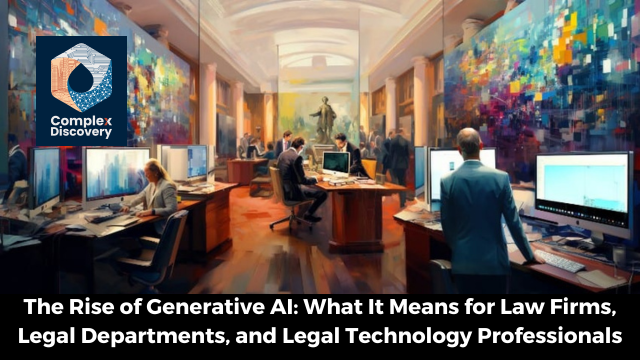[EDRM Editor’s Note: This article was first published July 22, 2023 and EDRM is grateful to Rob Robinson and ComplexDiscovery for permission to republish.]

ComplexDiscovery Editor’s Note: This cogent analysis presents selected results from the recent survey report “Generative AI in the Law: Where Could This All Be Headed?” sponsored by Wolters Kluwer and conducted by Above the Law. The survey results provide valuable insights into the intersection of artificial intelligence and the legal sector. With responses from 275 legal professionals, the survey results offer a perspective on the potential impact of generative AI on various practice areas, business functions, and job roles within the legal industry. The aim is to highlight the transformative potential of AI, the opportunities and challenges it presents, and the implications for the future of law firms and legal departments. This article intends to provide readers with a deeper understanding of the ongoing AI revolution in the legal sector and its potential trajectory in the future.
For cybersecurity, information governance, and eDiscovery professionals, understanding these trends and adapting accordingly will be crucial for surviving and thriving in the AI-driven legal landscape.
Rob Robinson, ComplexDiscovery
Industry Report Summary
Generative AI In The Law: Where Could This All Be Headed?
ComplexDiscovery Staff
Setting the Stage: AI’s Emerging Role in the Legal Sector and Its Implications
Artificial Intelligence (AI) is rapidly transforming various industries, and the legal sector is no exception. A recent survey on generative AI sponsored by Wolters Kluwer, a global leader in professional information, software solutions, and services, reveals that generative AI could significantly impact the success of law firms and legal departments within the next five years. This article delves into the survey’s key findings and explores why this information is beneficial for cybersecurity, information governance, and eDiscovery professionals.
The Impact of Generative AI on Law Firms and Legal Departments
According to the survey, 62% of respondents believe that the effective use of generative AI will separate successful law firms and legal departments from unsuccessful ones within the next five years. This prediction underscores the transformative potential of AI in the legal industry. Generative AI can automate routine tasks, streamline operations, and enhance decision-making processes, thereby increasing efficiency and reducing costs.
For cybersecurity, information governance, and eDiscovery professionals, this shift towards AI-driven operations presents both opportunities and challenges. On the one hand, AI can automate tedious tasks, freeing up professionals to focus on more complex issues. On the other hand, the increasing reliance on AI necessitates robust cybersecurity measures to protect sensitive data and maintain compliance with data privacy regulations.

